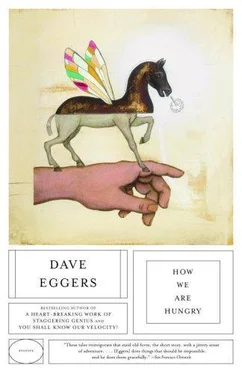Dave Eggers - How We Are Hungry
Здесь есть возможность читать онлайн «Dave Eggers - How We Are Hungry» весь текст электронной книги совершенно бесплатно (целиком полную версию без сокращений). В некоторых случаях можно слушать аудио, скачать через торрент в формате fb2 и присутствует краткое содержание. Год выпуска: 2005, Издательство: Vintage Canada, Жанр: Современная проза, на английском языке. Описание произведения, (предисловие) а так же отзывы посетителей доступны на портале библиотеки ЛибКат.
- Название:How We Are Hungry
- Автор:
- Издательство:Vintage Canada
- Жанр:
- Год:2005
- ISBN:нет данных
- Рейтинг книги:3 / 5. Голосов: 1
-
Избранное:Добавить в избранное
- Отзывы:
-
Ваша оценка:
- 60
- 1
- 2
- 3
- 4
- 5
How We Are Hungry: краткое содержание, описание и аннотация
Предлагаем к чтению аннотацию, описание, краткое содержание или предисловие (зависит от того, что написал сам автор книги «How We Are Hungry»). Если вы не нашли необходимую информацию о книге — напишите в комментариях, мы постараемся отыскать её.
A Heartbreaking Work of Staggering Genius
How We Are Hungry — читать онлайн бесплатно полную книгу (весь текст) целиком
Ниже представлен текст книги, разбитый по страницам. Система сохранения места последней прочитанной страницы, позволяет с удобством читать онлайн бесплатно книгу «How We Are Hungry», без необходимости каждый раз заново искать на чём Вы остановились. Поставьте закладку, и сможете в любой момент перейти на страницу, на которой закончили чтение.
Интервал:
Закладка:
Shelly is in her late forties and looks precisely her age. She is slim, fit, almost wiry. Her hair, long, ponytailed, once blond, is fading to gray and she is not fighting it. She has the air of a lion, Rita thinks, though she doesn’t know why she thinks of this animal, a lion, when she sees this small woman sitting two seats before her, in an anorak of the most lucid and expectant yellow. She watches Shelly tie a bandanna around her neck, quickly and with a certain offhand ferocity. Shelly’s features are the features Rita would like for herself: a small thin nose with a flawless upward curve, her lips with the correct and voluptuous lines, lips that must have been effortlessly sexual and life-giving as a younger woman.
“It’s really miserable out there,” Shelly says.
Rita nods.
“I’m finding myself annoyed by this,” Shelly says.
Rita smiles.
The bus stops in front of a clapboard building, crooked, frowning, like a general store in a Western. There are signs and farm instruments attached to its side, and on the porch, out of the rain, there are two middle-aged women feeding fabric through sewing machines, side by side. Their eyes briefly sweep over the bus and its passengers, and then return to their work as the bus begins again.
Frank is talking about the porters. Porters, he says, will be accompanying the group, carrying the duffel bags, and the tents, and the tables to eat upon, and the food, and propane tanks, and coolers, and silverware, and water, among other things. Their group is five hikers and two guides, and there will be thirty-two porters coming along.
“I had no idea,” Rita says to Grant, behind her. “I pictured a few guides and maybe two porters.” She has a sudden vision of servants carrying kings aboard gilt thrones, elephants following, trumpets announcing their progress.
“That’s nothing,” Frank says. Frank has been listening to everyone’s conversations and inserting himself when he sees fit. “Last time I did Everest, there were six of us and we had eighty Sherpas.” He holds his hand horizontally, demonstrating the height of the Sherpas, which seems to be about four feet. “Little guys,” he says, “but badasses. Tougher than these guys down here. No offense, Patrick.”
Patrick isn’t listening. The primary Tanzanian guide, he’s in his early thirties and is dressed in new gear — a blueberry anorak, snowboarding pants, wraparound sunglasses. He’s watching the side of the road, where a group of boys is keeping pace with the bus, each in a school uniform and each carrying what looks to be a small sickle. They run alongside, four of them, waving their sickles, yelling things Rita can’t hear through the windows and over the whinnies of the van going up and up through the wet dirt. Their mouths are going, their eyes angry and their teeth are so small, but by the time Rita gets her window open to hear what they’re saying the van is far beyond them, and they have run off the road with their sickles. They’ve dropped down the hillside, following some narrow path of their own making.
There is a wide black parking lot. MACHAME GATE reads a sign over the entrance. In the parking lot, about a hundred Tanzanian men are standing. They watch the bus enter the lot and park and immediately twenty of them converge upon it, unloading the backpacks and duffel bags from the bus. Before Rita and the rest of the hikers are off, all of the bags are stacked in a pile nearby, and the rain is falling upon them.
Rita is last off the bus, and when she arrives at the door, Godwill has closed it, not realizing she is still aboard.
“Sorry please,” he says, yanking the lever, trying to get the door open again.
“Don’t worry, I’m in no hurry,” she says, giving him a little laugh.
She sees a man between the parking lot and the gate to the park, a man like the man at her hotel, in a plain green uniform, automatic rifle on his back.
“Is the gun for the animals, or the people?” she asks.
“People,” Godwill says, with a small laugh. “People much more dangerous than animals!” Then he laughs and laughs and laughs.
It’s about forty-five degrees, Rita guesses, though it could be fifty. And the rain. It’s raining steadily, and the rain is cold. Rita hadn’t thought about rain. When she had pictured the hike she had not thought about cold, cold, steady rain.
“Looks like we’ve got ourselves some rain,” Frank says.
The paying hikers look at him.
“No two ways about it,” he says.
Everything is moving rapidly. Bags are being grabbed, duffels hoisted. There are so many porters! Everyone is already wet. Patrick is talking with a group of the porters. They are dressed in bright colors, like the paying hikers, but their clothes — simple pants and sweatshirts — are already dirty, and their shoes are not large and complicated boots, as Rita is wearing, but instead sneakers, or track shoes, or loafers. None wear rain gear, but all wear hats.
Now there is animated discussion, and some pointing and shrugging. One porter jumps to the ground and then lies still, as if pretending to be dead. The men around him roar.
Rita ducks into her poncho and pulls it over her torso and backpack. The poncho was a piece of equipment the organizers listed as optional; no one, it seems, expected this rain. Now she is thrilled she bought it—$4.99 at Target on the way to the airport. She sees a few of the porters poking holes in garbage bags and fitting themselves within. Grant is doing the same. He catches Rita looking at him.
“Forgot the poncho,” he says. “Can’t believe I forgot the poncho.”
“Sorry,” she says. There is nothing else to say. He’s going to get soaked.
“It’s okay,” he says. “Good enough for them, good enough for me.”
Rita tightens the laces on her boots and readjusts her gaiters. She helps Shelly with her poncho, spreading it over her backpack, and arranges her hood around her leonine hair, frayed and thick, blond and white. As she pulls the plastic close to Shelly’s face, they stare into each other’s eyes and Rita has a sharp pain in her stomach, or her head, somewhere. She wants them here. They are her children and she allowed them to be taken. People were always quietly taking things from her, always with the understanding that everyone would be better off if Rita’s life were kept simplified. But she was ready for complication, wasn’t she? For a certain period of time, she was, she knows. It was the condominium that concerned everyone; she had almost bought one, in anticipation of adopting the kids, and she had backed out — but why? — just before closing. The place wasn’t right; it wasn’t big enough. She wanted it to be more right; she wanted to be more ready. It wasn’t right, and the kids and her own parents would know it, and they would think she would always be insolvent, and they would always have to share a room. Gwen had offered to co-sign on the other place, the place they looked at with the yard and the three bedrooms, but that wouldn’t be right, having Gwen on the mortgage. So she had given up and the kids were now in her old room, with her parents. She wants them walking next to her asking her advice. She wants to arrange their hoods around their faces, wants to pull the drawstrings so their faces shrink from view and stay dry. Shelly’s face is old and lined and she grins at Rita and clears her throat.
“Thank you, hon,” she says.
They are both waterproof now and the rain tick-ticks onto the plastic covering them everywhere. The paying hikers are standing in the parking lot in the rain.
“Porters have dropped out,” says Frank, speaking to the group. “They gotta replace the porters who won’t go up. It’ll take a few minutes.”
“Are there replacements close by?” Shelly asks.
Читать дальшеИнтервал:
Закладка:
Похожие книги на «How We Are Hungry»
Представляем Вашему вниманию похожие книги на «How We Are Hungry» списком для выбора. Мы отобрали схожую по названию и смыслу литературу в надежде предоставить читателям больше вариантов отыскать новые, интересные, ещё непрочитанные произведения.
Обсуждение, отзывы о книге «How We Are Hungry» и просто собственные мнения читателей. Оставьте ваши комментарии, напишите, что Вы думаете о произведении, его смысле или главных героях. Укажите что конкретно понравилось, а что нет, и почему Вы так считаете.












